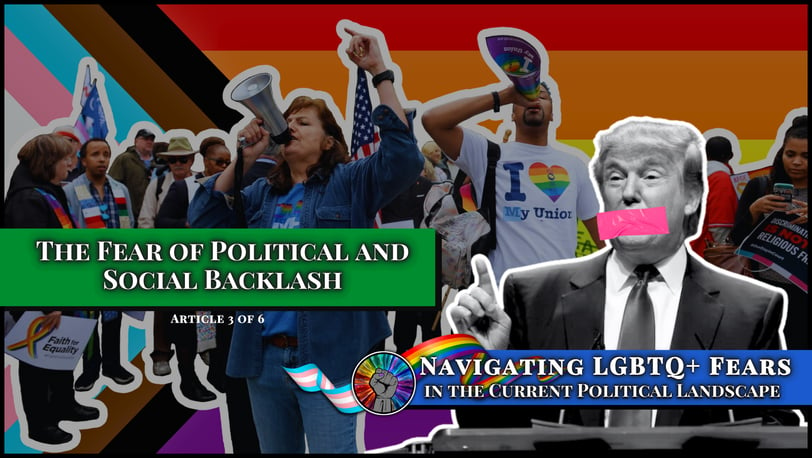
The Fear of Political and Social Backlash
In part 3 of my 6-part series, I explore how LGBTQ+ professionals can counteract political and social backlash by leveraging their strengths strategically.
Miles Berdache Lynk
3/12/20254 min read



Understanding the Fear
The rise of anti-LGBTQ+ rhetoric in recent years has not only stalled progress but has also intensified the risk of backlash in both political and social spaces. Policies such as banning transgender individuals from military service and dismantling protections for LGBTQ+ students have sent a clear message that discrimination can be institutionalized. This environment of hostility creates a profound fear of speaking openly about one’s identity, particularly in regions or workplaces where such sentiments are prevalent.
For many LGBTQ+ professionals, this fear extends beyond professional repercussions—it’s about personal safety and preserving mental well-being. The anxiety of being targeted, both online and offline, combined with the stress of navigating environments that may not fully support them, can lead to self-censorship and isolation. Understanding this fear is essential because it allows individuals to acknowledge the impact of external pressures on their confidence and authenticity. Recognizing the validity of this fear is the first step to transforming it into actionable courage.
The Trump Administration’s Role in Fueling Fear
The Trump administration has implemented several policies that have contributed to this environment of fear:
Redefinition of Gender: An executive order defined sex as a binary concept based on biological characteristics at birth, effectively erasing federal recognition of transgender and non-binary identities.
Military Restrictions: Transgender individuals were barred from serving in the military, with the rationale that their presence conflicted with military standards.
Healthcare Limitations: Federal funding was threatened for medical institutions providing gender-affirming care to minors, labeling such treatments as harmful.
Educational Policies: Schools that support students' gender transitions faced potential loss of federal funding.
Passport and Documentation Changes: The State Department required individuals to use their sex assigned at birth on official documents, eliminating self-selection of gender.
These policies institutionalized discrimination, intensifying the fear of expressing one’s identity openly. For many LGBTQ+ professionals, this fear extends beyond workplace concerns to include personal safety and mental well-being.
Proactive Actions to Take
1. Prioritize Mental Health: Setting Boundaries with Toxic Conversations
Why It Matters: Constant exposure to negative rhetoric can lead to burnout, anxiety, and a diminished sense of self-worth. Protecting mental health conserves your emotional energy for the battles that truly matter.
Action Steps:
Establish Boundaries: Limit exposure to debates or discussions with hostile individuals or platforms.
Curate Social Media: Unfollow or mute accounts that frequently share discriminatory content. Fill your feed with affirming voices.
Seek Affirming Support: Connect with LGBTQ+-affirming therapists or support groups for regular check-ins.
Pro Tip: Practice the “three-breath pause” technique in triggering situations—breathe in deeply, hold, and exhale slowly to regain composure.
2. Engage in Community Building: Strengthening Networks within LGBTQ+ Organizations
Why It Matters: Isolation exacerbates fear. Building connections with like-minded individuals provides a buffer against societal backlash.
Action Steps:
Join LGBTQ+ Organizations: Participate in local or online groups that advocate for LGBTQ+ rights, such as the Human Rights Campaign or The Trevor Project.
Volunteer for a Cause: Engaging in activism expands your network and provides a sense of purpose.
Create Safe Spaces: If networks are limited, consider informal meetups or virtual support groups.
Pro Tip: Attend LGBTQ+ conferences or webinars focused on advocacy and leadership to broaden your network and gain inspiration.
3. Use Your Voice: Sharing Experiences and Advocating for Inclusion
Why It Matters: Sharing personal stories is a powerful way to build empathy and counter negative narratives.
Action Steps:
Leverage Social Media: Share your story and support for LGBTQ+ causes on LinkedIn, Twitter, or Instagram.
Write and Speak Publicly: Consider blogs, opinion pieces, or public speaking to amplify your voice.
Collaborate with Allies: Work with straight allies who can help elevate LGBTQ+ issues to broader audiences.
Pro Tip: Use the storytelling framework: challenge, choice, outcome. This approach makes your story relatable and actionable.
CliftonStrengths® in Action
1. Empathy: Navigating Difficult Conversations
Strength Insight: Empathy helps you understand emotions, making it easier to manage tough dialogues without escalating tensions.
Application: Use Empathy to acknowledge fears from different perspectives, fostering productive conversations.
2. Communication: A Powerful Tool for Storytelling and Advocacy
Strength Insight: Communication excels at transforming complex issues into compelling narratives.
Application: Share stories that highlight both challenges and successes, mobilizing allies effectively.
3. Positivity: Sustaining Hope and Resilience in Challenging Times
Strength Insight: Positivity fosters hope, which is crucial for maintaining momentum in the face of backlash.
Application: Reframe negative situations by focusing on progress and sharing uplifting stories of resilience.
Combining Strengths for Greater Impact
Leveraging Empathy, Communication, and Positivity in combination can create a powerful strategy for counteracting political and social backlash:
Empathy + Communication: Humanize advocacy by sharing personal stories that resonate emotionally while articulating LGBTQ+ challenges in a compelling and relatable way.
Empathy + Positivity: Build resilient support systems by understanding the emotional impact of backlash and offering hope and encouragement to sustain motivation.
Communication + Positivity: Inspire and mobilize change by translating complex issues into clear, actionable messages infused with optimism and a vision for progress.
In Summary: Transforming Fear into Courage
Political and social backlash can create a profound fear of expressing one’s identity. However, by combining Empathy, Communication, and Positivity, LGBTQ+ professionals can transform this fear into a source of strength. Empathy builds understanding and bridges divides, Communication amplifies voices and stories that need to be heard, and Positivity sustains hope through adversity. Together, these strengths not only counteract negativity but also empower individuals to stand firm in their authenticity and drive meaningful change.
Call to Action: Reflect on your top CliftonStrengths® and consider how you can leverage them to build courage, advocate for inclusion, and create positive change. Let’s continue this conversation—together, we got this!

CONTACT
(866) 356-8066
Miles@UDOUCoach.com
Copyright © 2024 | UDOU Coaching & Consulting, LLC | All Rights Reserved

